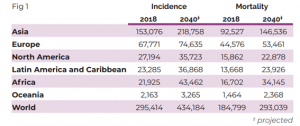World Ovarian Cancer Day falls on 8 May 2022. This event was created by ovarian cancer advocacy organisations around the world in 2013 to increase awareness and “globally raise our voices in solidarity in the fight against ovarian cancer”.
In this article we look at what ovarian cancer is along with some key global statistics and examine how some Sexually Transmitted Infections (STIs) are linked with ovarian cancer.
What is Ovarian Cancer?
Primarily affecting the ovaries, Ovarian Cancer acts as an overall term for up to 30 different cancers that also affect the fallopian tubes, and the primary peritoneal cavity.
The symptoms of ovarian cancer, such as bloating, are not always obvious, so females are usually diagnosed once the cancer has already spread. This makes it more difficult to treat, so it is considered one of the most lethal of cancers in women.
How prevalent is Ovarian Cancer globally?
There were approximately 295,000 cases of ovarian cancer worldwide in 2018 with nearly 185,000 deaths, and more than 750,000 females were still living within five years of diagnosis.
On Globocan´s Cancer Tomorrow website they predict that by the year 2040, incidence will rise by 47% to an estimated 434,000. There will also be a larger increase in fatalities each year up nearly 59% to over 293,000. Globocan figures in 2018 report that ovarian cancer is the 8th most common cancer and the 8th most common cause of death from cancer in women globally.
The following table shows the numbers of those affected by ovarian cancer and Globocan´s future projections by continent.

Australian ovarian cancer statistics
Ovarian cancer was the ninth most diagnosed cancer among Australian women in 2017 and this trend is expected to continue into 2021 and beyond. The total number of new cases of ovarian cancer in 2017 was 1,615 and this is expected to rise to an estimated 1,720 once the figures for 2021 are published.
In total there were 1,075 deaths from ovarian cancer in Australia in 2019. It is estimated that a female in Australia has a 1 in 142 risk of dying from ovarian cancer by the age of 85.
What STIs are linked to Ovarian Cancer?
Certain sexually transmitted bacterial and viral infections have been linked to ovarian cancer by inducing persistent changes in the female genital tract. These STIs include HPV, Herpes Simplex Virus type 2 (HSV-2), Chlamydia Trachomatis and Mycoplasma Genitalium.
Chlamydia and Mycoplasma are also associated with salpingitis, tubal infertility and pelvic inflammatory disease (PID). PID has been associated with increased ovarian cancer risk.
How can Better2Know help?
Regular sexual health testing will allow you to obtain diagnosis and effective treatment in the early stages of an infection. This will reduce the likelihood of acquiring a life-threatening illness and help protect the long term health prospects of you and your partner.
Better2Know offers a range of STI tests and STI Screens. You can take an individual Chlamydia, Mycoplasma, HPV or Herpes test or choose a comprehensive STI screen, such as our Full Screen which tests for a number of different STIs.
If you have any questions or concerns about your sexual health then please speak with one of our highly trained advisors, either by phone using the number at the top of this page or through our live online webchat. Better2Know can make you an appointment at a sexual health clinic near you and arrange confidential consultations and appointments.
Sources
[1] Worldovariancancercoalition.org: May 8 – World Ovarian Cancer Day
[2] Worldovariancancercoalitiion.org: World Ovarian Cancer Coalition Atlas 2020
[3] Mater.ie: Ovarian Cancer
[4] British Journal of Cancer: Sexually transmitted infections and risk of epithelial ovarian cancer: results from the Nurses’ Health Studies
[5] Cancer Australia: Ovarian cancer statistics





